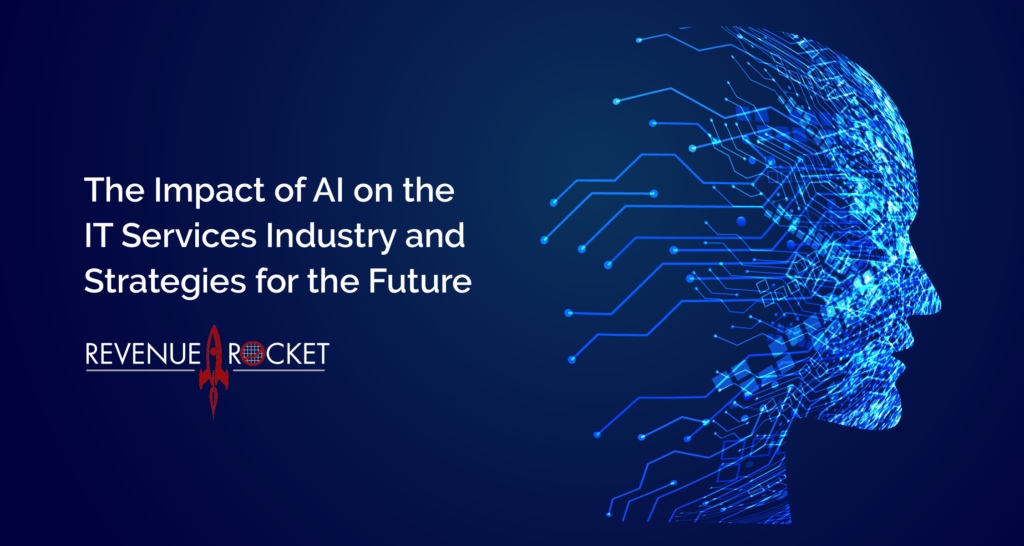10 Feb The Impact of AI on the IT Services Industry and Strategies for the Future
Artificial Intelligence (AI) is revolutionizing nearly every industry, and the IT services sector—particularly Managed Services Providers (MSPs)—is no exception. AI is rapidly automating tasks, improving service delivery, and shifting client expectations. This transformation poses both significant opportunities and existential threats to traditional MSPs.
For IT services providers, the pressing questions are:
- How will AI disrupt traditional managed services?
- How can providers adapt to remain competitive?
- Should providers consider selling before AI-driven commoditization reduces valuations?
This analysis explores these key issues and provides strategic recommendations for MSPs to either evolve or exit at the right time.
The Disruptive Impact of AI on IT Services (Managed Service Providers)
AI’s influence on IT services can be categorized into four primary areas:
1. Automation of Traditional IT Support and Monitoring
- AI-powered monitoring tools (e.g., AIOps, predictive analytics) are replacing human-driven IT operations.
- Self-healing systems use AI to detect and resolve issues before they impact end-users.
- AI-driven chatbots and virtual assistants are reducing reliance on Level 1 and Level 2 IT support staff.
Implication for MSPs: Clients will demand more automation, reducing the need for traditional break-fix models and lowering service fees for routine support.
2. Cybersecurity Transformation
- AI-driven cybersecurity platforms (e.g., Microsoft Security Copilot, Darktrace, SentinelOne) are improving threat detection and response times.
- Machine learning models analyze user behavior and network traffic to predict security incidents before they happen.
- Automated remediation reduces the need for manual intervention.
Implication for MSPs: Traditional security services will become commoditized. MSPs should look to evolve into Managed Security Services Providers (MSSPs) with AI-driven security offerings.
3. Shift from Infrastructure Management to Cloud and AI-Enabled Services
- Cloud providers (AWS, Azure, Google Cloud) offer AI-powered services that reduce the need for MSPs to manage on-premises infrastructure.
- AI-based automation in cloud environments (e.g., AWS Lambda, Azure AI) enables businesses to self-manage more IT functions.
- Infrastructure-as-Code (IaC) and AI-enhanced DevOps are reducing dependency on external IT providers.
Implication for MSPs: Businesses will favor cloud-based AI-native solutions over traditional MSP models, forcing providers to transition to cloud consulting, AI integration, and DevOps services.
4. The Commoditization of Traditional IT Services
- AI-enabled platforms (e.g., ServiceNow, Datadog, IT Glue with AI features) are reducing the manual workload of MSPs.
- MSP pricing models based on per-device or per-user fees will erode as AI-driven tools reduce support needs.
- Enterprises and SMBs will expect outcome-based pricing rather than hourly billing for IT services.
Implication for MSPs: Margins will shrink, and MSPs that provide specialized AI-enabled services will remain competitive.
How MSPs Can Remain Relevant in an AI-Driven Market
To survive and thrive, MSPs must pivot from traditional models to value-driven AI-powered solutions. Here’s how:
1. Invest in AI-Powered IT Operations (AIOps)
- Leverage AI to automate monitoring, diagnostics, and issue resolution.
- Offer predictive analytics to optimize client IT environments.
- Partner with AIOps providers (e.g., Moogsoft, Dynatrace, Splunk) to provide advanced automation.
Action Item: Shift from reactive IT management to proactive AI-driven IT operations.
2. Develop AI-Based Cybersecurity Services
- Build an MSSP model that integrates AI-driven threat detection and automated incident response.
- Use AI-powered Security Information and Event Management (SIEM) and Extended Detection and Response (XDR) solutions.
- Focus on compliance-driven AI security services for regulated industries.
Action Item: Offer AI-enhanced cybersecurity services.
3. Specialize in AI and Cloud Consulting
- Help clients integrate AI solutions into their business workflows.
- Provide AI-augmented automation solutions for IT and business processes.
- Transition from infrastructure management to AI-enabled cloud advisory services.
Action Item: Become a strategic AI partner rather than just an IT support provider.
4. Embrace AI for Service Desk Automation
- Deploy AI-driven chatbots to handle common IT support requests.
- Implement AI-powered Remote Monitoring and Management (RMM) solutions.
- Reduce dependency on low-level IT support staff while focusing on complex problem-solving.
Action Item: Automate L1/L2 support to cut costs and focus on higher-value services.
5. Differentiate Through Industry-Specific AI Solutions
- Develop AI-driven automation tailored for specific industries (healthcare, finance, manufacturing, etc.).
- Offer AI-powered data analytics and insights for business intelligence.
- Position as a vertical-specific MSP that provides AI-driven solutions for compliance, security, and efficiency.
Action Item: Move beyond generic MSP offerings and become a niche AI-driven provider.
Should MSPs Sell Before AI Disrupts Valuations?
For MSPs unable or unwilling to make the AI transition, selling at a peak valuation before AI-driven commoditization is a smart move. Key considerations:
1. Why MSP Valuations May Decline
- The decline of labor-intensive IT services means fewer revenue streams.
- Larger IT providers are acquiring AI capabilities, increasing competition.
- AI-driven cost reductions will lower MSP profit margins.
2. When Is the Right Time to Sell?
- Before AI fully disrupts the market. MSPs that sell early will receive higher valuations than those selling post-commoditization.
- If AI investment is beyond reach. MSPs that lack the capital to invest in AI should consider exiting before market decline.
- When an acquisition opportunity presents itself. IT conglomerates, MSSPs, and private equity firms are acquiring MSPs with strong customer bases.
3. Who Are Potential Buyers?
- Private equity firms looking to consolidate MSPs into AI-driven platforms.
- Larger IT service providers expanding their AI and cybersecurity portfolios.
Cloud and cybersecurity firms seeking client bases for AI-driven offerings.



